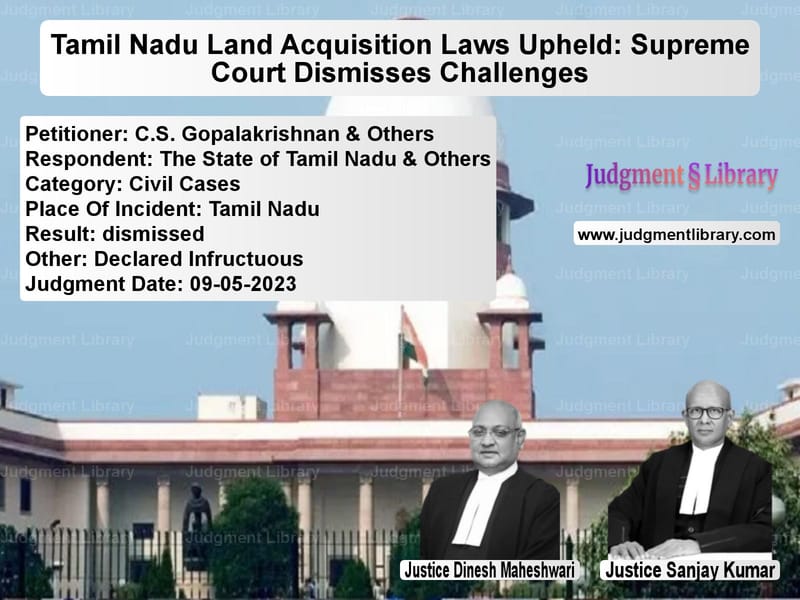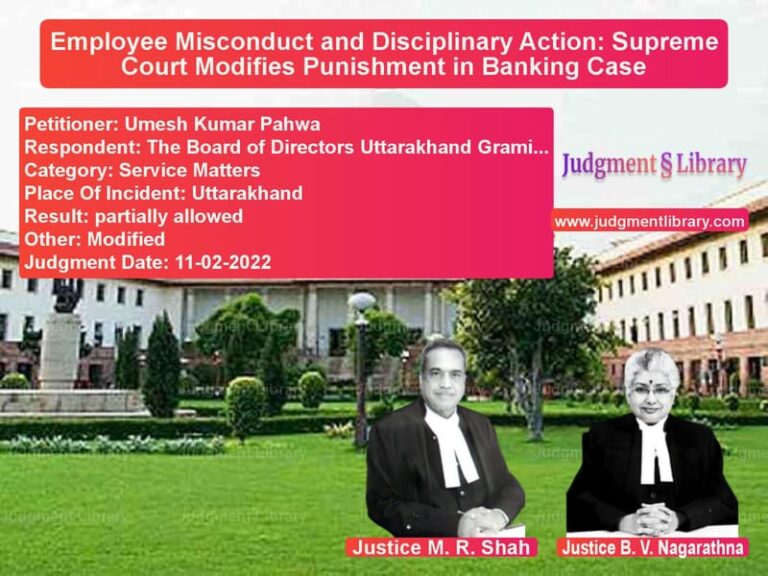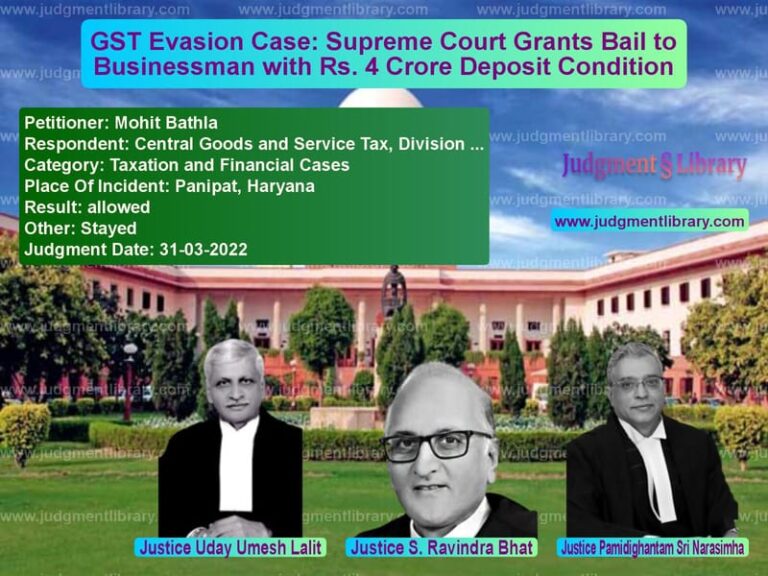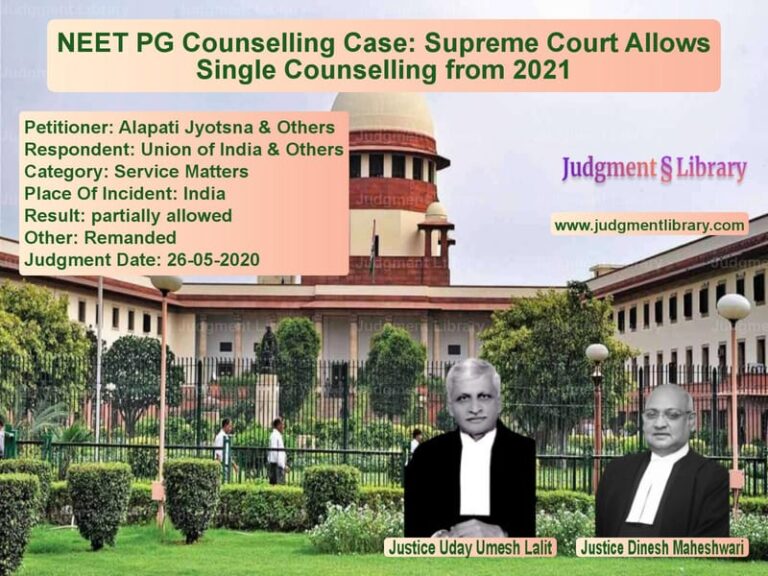Tamil Nadu Land Acquisition Laws Upheld: Supreme Court Dismisses Challenges
The case of C.S. Gopalakrishnan & Others vs. The State of Tamil Nadu & Others revolved around the constitutional validity of land acquisition laws enacted by the State of Tamil Nadu. The Supreme Court examined whether these state laws, which deviated from central legislation, violated the principles of fairness and equality enshrined in the Constitution.
Background of the Case
The dispute originated when the Tamil Nadu government enacted three special laws for land acquisition:
- The Tamil Nadu Acquisition of Land for Harijan Welfare Schemes Act, 1978
- The Tamil Nadu Acquisition of Land for Industrial Purposes Act, 1997
- The Tamil Nadu Highways Act, 2001
These state laws allowed for expedited land acquisition, bypassing the procedural safeguards of the Land Acquisition Act, 1894. The enactments received Presidential assent under Article 254(2) of the Constitution, giving them overriding authority over the central law.
However, with the introduction of the Right to Fair Compensation and Transparency in Land Acquisition, Rehabilitation and Resettlement Act, 2013 (referred to as the new LA Act), these state laws were rendered repugnant. To counter this, Tamil Nadu passed the Tamil Nadu Land Acquisition Laws (Revival of Operation, Amendment and Validation) Act, 2019 (Validation Act of 2019), which again received Presidential assent, reviving the state laws.
Petitioners’ Arguments
The petitioners challenged the validity of the Tamil Nadu laws on the following grounds:
- Arbitrariness: The state laws lacked procedural safeguards like social impact assessments, time limits, and fair compensation principles present in the new LA Act.
- Violation of Article 14: Landowners in Tamil Nadu were treated unfairly compared to landowners in other states where the central law applied.
- Presidential Assent Cannot Revive a Void Law: Once the new LA Act was passed, the Tamil Nadu laws became void, and merely obtaining fresh Presidential assent could not revive them.
- Delay in Land Acquisition Process: The state government took years between issuing acquisition notices and finalizing acquisitions, causing hardships to landowners.
Respondents’ Arguments
The State of Tamil Nadu defended its laws, arguing that:
- Presidential Assent Validates the Laws: The Validation Act of 2019 cured any repugnancy, making the state laws legally enforceable.
- Speedy Land Acquisition: The state laws ensured faster acquisition without bureaucratic delays inherent in the new LA Act.
- Legislative Competence: Land acquisition falls under the Concurrent List, allowing Tamil Nadu to enact its own legislation.
- No Discrimination: Article 14 does not mandate that all states must have identical laws; different states can have different policies based on their needs.
Supreme Court’s Ruling
The Supreme Court upheld the Tamil Nadu land acquisition laws, rejecting the petitioners’ claims. The key findings were:
1. Presidential Assent Cures Repugnancy
The Court ruled that under Article 254(2), once the President gives assent to a state law, it overrides the central law within that state. Therefore, the Tamil Nadu laws remained valid.
2. No Violation of Article 14
The Court held that different laws for different states do not automatically violate Article 14. As long as the laws serve a legitimate purpose, they are constitutionally valid.
3. Procedural Safeguards Are Not Mandatory
The absence of provisions like social impact assessments does not automatically render a law unconstitutional. The legislature has the discretion to determine the procedural framework.
4. Time Delays Do Not Invalidate Laws
The Court acknowledged delays in land acquisition but held that individual instances of delay do not make the entire law unconstitutional. Landowners could challenge delays in specific cases, but the law itself remained valid.
Conclusion
The Supreme Court’s decision reaffirmed the power of states to enact land acquisition laws tailored to their needs, provided they have Presidential assent. While the ruling upheld Tamil Nadu’s laws, it also highlighted the need for better implementation to prevent hardships for affected landowners.
Petitioner Name: C.S. Gopalakrishnan & Others.Respondent Name: The State of Tamil Nadu & Others.Judgment By: Justice Dinesh Maheshwari, Justice Sanjay Kumar.Place Of Incident: Tamil Nadu.Judgment Date: 09-05-2023.
Don’t miss out on the full details! Download the complete judgment in PDF format below and gain valuable insights instantly!
Download Judgment: c.s.-gopalakrishnan-vs-the-state-of-tamil-n-supreme-court-of-india-judgment-dated-09-05-2023.pdf
Directly Download Judgment: Directly download this Judgment
See all petitions in Property Disputes
See all petitions in Landlord-Tenant Disputes
See all petitions in Contract Disputes
See all petitions in Judgment by Dinesh Maheshwari
See all petitions in Judgment by Sanjay Kumar
See all petitions in dismissed
See all petitions in Declared Infructuous
See all petitions in supreme court of India judgments May 2023
See all petitions in 2023 judgments
See all posts in Civil Cases Category
See all allowed petitions in Civil Cases Category
See all Dismissed petitions in Civil Cases Category
See all partially allowed petitions in Civil Cases Category







